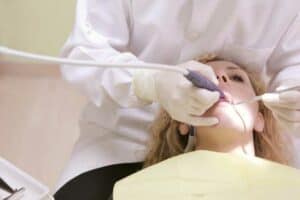
The Habitual Cheek Bite
Biting your cheeks might seem innocuous, but when done regularly, it can have repercussions beyond just temporary discomfort. Habitual cheek biting involves repeatedly clenching your teeth down on the soft tissue of your inner cheeks. Over time, this can cause irritation, inflammation, and even result in sores or ulcers in the mouth. While these symptoms might be uncomfortable on their own, they can also indirectly affect your teeth.
Dental Damage: Consistent cheek biting can create pressure on your teeth. This constant pressure can result in micro-fractures, chips, or cracks in your teeth. Over time, this damage might necessitate dental treatments such as dental bonding, fillings, or even crowns to restore the affected teeth.
Shift in Tooth Alignment: Habitual cheek biting can also affect the alignment of your teeth. The repetitive movement of your teeth against the cheek can push them out of their natural positions, potentially leading to malocclusion or misalignment. This might require treatment from your Ann Arbor dentist to correct the issue.
Bruxism Aggravation: Cheek biting is often associated with bruxism – the habit of clenching or grinding your teeth, usually during sleep. Bruxism can lead to enamel erosion, tooth sensitivity, and jaw pain. Habitual cheek biting can exacerbate these issues, intensifying the impact of bruxism on your dental health.
Prevention and Management
There are several ways you can prevent dental damage caused by habitual cheek biting including:
Awareness and Mindfulness: The first step in addressing cheek biting is to become more aware of when you’re doing it. Pay attention to moments when you catch yourself biting your cheeks, and try to identify any triggers. Practicing mindfulness and stress reduction techniques can also help minimize the instances of cheek biting.
Mouthguards: For those who find it challenging to control cheek biting, your dentist in Ann Arbor can create custom mouthguards or splints to help. These devices act as a barrier between your teeth and cheeks, preventing direct contact and reducing the potential damage caused by clenching and grinding.
Biting your cheeks might seem like a minor concern, but its impact on your dental health can be significant. From dental damage and misalignment to exacerbating bruxism-related problems, this seemingly harmless habit can lead to various oral health issues. The key lies in awareness, stress management, and seeking professional guidance when needed. By taking steps to address and mitigate cheek biting, you can preserve your dental health and maintain a confident smile for years to come.
Remember, a proactive approach to oral health can lead to a happier and healthier mouth.We’re always accepting new patients at our dental offices in Ann Arbor, Canton, Farmington Hills, and Livonia.

The Oral-Brain Connection
The mouth serves as the gateway to the body, and its health can impact various aspects of overall health, so it’s not surprising that the oral-brain connection has caught the attention of scientists. Poor oral hygiene can lead to the accumulation of harmful bacteria in the mouth, causing gum disease and other oral infections. Interestingly, these oral pathogens don’t just stay confined to the mouth – they can find their way into the bloodstream and potentially reach the brain.
Inflammation and Alzheimer’s
One of the key factors linking oral health and Alzheimer’s disease is inflammation. Chronic inflammation is believed to contribute to the development and progression of various diseases, including Alzheimer’s. Gum disease triggers an inflammatory response in the body, and if left untreated, this inflammation can spread to other parts of the body, including the brain.
Research has shown that the presence of specific oral bacteria associated with gum disease can be detected in the brains of individuals with Alzheimer’s disease. These bacteria might contribute to the formation of beta-amyloid plaques, a hallmark of Alzheimer’s, by activating the immune system and promoting inflammation in the brain. Therefore, maintaining good oral health could potentially help reduce the risk of chronic inflammation and its potential impact on brain health.
The Blood-Brain Barrier
The blood-brain barrier is a protective network of blood vessels that acts as a barrier between the bloodstream and the brain. It prevents harmful substances from entering the brain while allowing essential nutrients to pass through. However, certain infections and inflammatory responses can compromise the integrity of this barrier, potentially allowing harmful agents to reach the brain.
Oral bacteria associated with gum disease can release toxins that may weaken the blood-brain barrier. This weakening can make it easier for harmful substances to enter the brain, triggering an immune response that contributes to inflammation and damage. By maintaining good oral health, you might be able to reduce the risk of these oral bacteria infiltrating the brain and compromising the blood-brain barrier’s function.
Preventive Strategies
While research into the link between oral health and Alzheimer’s is still ongoing, there are several steps you can take to prioritize your oral hygiene and potentially support your cognitive health:
Brush & Floss Regularly: The foundation of good oral hygiene lies in regular brushing and flossing. Brush your teeth at least twice a day with fluoride toothpaste and don’t forget to floss to remove food particles and plaque from between your teeth.
Visit Your Dentist in Canton: Regular dental check-ups are essential for detecting and addressing any oral health issues early on. Your dentist can help you maintain healthy gums and catch any signs of gum disease.
Eat A Balanced Diet: A diet rich in fruits, vegetables, lean proteins, and whole grains can contribute to both oral and overall health. Avoid sugary snacks and beverages that can promote tooth decay.
Stay Hydrated: Drinking water helps wash away food particles and bacteria that can lead to plaque formation.
Avoid Smoking & Excessive Alcohol: Smoking and heavy alcohol consumption are linked to increased risk of gum disease and can have negative effects on oral health.
The connection between oral health and cognitive health is an exciting area of research that holds promise for our understanding of neurodegenerative diseases like Alzheimer’s. While more studies are needed to establish a definitive link between good oral hygiene and reduced Alzheimer’s risk, the existing evidence suggests that prioritizing oral health might have more far-reaching benefits than we previously imagined. By taking care of your teeth and gums, you could potentially be taking a proactive step towards protecting your brain health in the long run. So, don’t underestimate the power of a healthy smile or the importance of visits to your dentist in Canton – they could be a window to a healthier brain.
We’re always accepting new patients at our dental offices in Ann Arbor, Canton, Farmington Hills, and Livonia.

The Surprising Link Between Dental Health and Headaches
Headaches happen to basically everyone and are a widespread issue, affecting millions of people around the world. They can range from mild discomfort to debilitating pain, significantly impacting one’s quality of life. While many things can trigger a headache, an often overlooked cause of chronic headaches or even migraines is dental problems.
Teeth Grinding
One of the most common dental-related causes of headaches is bruxism, which refers to the habit of grinding or clenching the teeth unconsciously. Bruxism often occurs during sleep or times of stress, and the constant pressure on the jaw and surrounding muscles can lead to tension headaches.
Malocclusion
Malocclusion, also known as misaligned teeth or a bad bite, can be a hidden culprit behind chronic headaches. When your teeth do not fit together correctly, it can strain the jaw muscles and lead to muscle tension, triggering headaches.
TMJ Disorder
Within the realm of dental health and headaches, one crucial aspect is Temporomandibular Joint (TMJ) disorders. These conditions can cause jaw pain, facial discomfort, and, most notably, headaches.
How Your Dentist Can Provide Headache Relief
Now that we’ve explored the dental factors that contribute to headaches, let’s delve into how your dentist can help provide relief and improve your overall well-being.
If you’re dealing with bruxism, your dentist in Farmington Hills can create a customized mouthguard or splint to wear while you sleep. This device acts as a protective barrier, preventing your teeth from grinding against each other and alleviating the strain on your jaw muscles. As a result, you may notice a significant reduction in headaches over time.
For individuals with a bad bite, orthodontic treatments can be life-changing. Braces, clear aligners, or other orthodontic appliances can gradually realign your teeth, improving your bite and reducing the tension that contributes to headaches.
In some cases, headaches may be linked to issues with the temporomandibular joint (TMJ), the hinge that connects your jaw to your skull. Your dentist can provide TMJ therapy, which may include exercises, medication, or other treatments, to alleviate discomfort and reduce headache frequency.
While most individuals seek headache or migraine relief from over-the-counter painkillers or home remedies, they may not realize that their headaches could be linked to their dental health and should see a dentist in Farmington Hills. So the next time you find yourself reaching for that painkiller to combat yet another headache, consider a different approach – visit your dentist!
We’re always accepting new patients at all of our dental offices in Ann Arbor, Canton, Farmington Hills, and Livonia.

What Is Dry Mouth?
Dry mouth, which is also medically known as xerostomia, is a condition that occurs when there isn’t enough saliva production in the mouth. It can happen to anyone, and while occasional dry mouth may be normal, chronic dryness can lead to a range of uncomfortable symptoms, and affect speech, eating, and even dental health.
What Causes Dry Mouth?
Numerous factors can trigger dry mouth, and understanding the root cause is crucial in determining the best, most effective treatments. Your dentist in Livonia will evaluate you for some of the most common causes of dry mouth including:
Medications
Certain medications, such as antihistamines, antidepressants, and diuretics, are notorious for causing dry mouth as a side effect.
Medical Conditions
Dry mouth can be a symptom of underlying medical conditions like Sjögren’s syndrome, diabetes, and autoimmune disorders. By understanding the connection between these conditions and dry mouth, we can explore potential cures tailored to each situation.
Lifestyle
External factors like smoking, alcohol consumption, and breathing through the mouth can exacerbate dry mouth symptoms.
The Consequences of Untreated Dry Mouth
The impact of untreated dry mouth goes beyond mere discomfort. For example, dry mouth can have potential consequences on oral health, nutrition, and overall well-being. Understanding these implications underscores the importance of finding viable solutions.
Available Treatments for Dry Mouth
While there might not be a one-size-fits-all cure for dry mouth, various treatments can help alleviate symptoms and improve the quality of life for those affected. Talk to your dentist in Livonia to determine the best treatment for your dry mouth.
Over-the-Counter Remedies
There’s an array of over-the-counter products specifically designed to combat dry mouth, including mouthwashes, sprays, and lozenges.
Lifestyle Changes
Embracing and making specific lifestyle changes like quitting smoking or limiting alcohol intake can also play a significant role in managing dry mouth.
Prescription Medications
For severe cases of dry mouth, prescription medications may offer more substantial relief.
Dry mouth may be an annoying challenge, but there are things you can try to help cure it. By determining the root cause, exploring available treatments, and making lifestyle changes, relief is within reach. If you or someone you know suffers from dry mouth, start by scheduling an appointment with your dentist in Livonia.
We have four dental offices in Ann Arbor, Canton, Farmington Hills, and Livonia. Call either our Panther Creek or Medical Plaza Drive office today.

What is Bruxism?
Before we delve into the causes and solutions, let’s grasp the fundamentals of bruxism. Bruxism refers to the habitual clenching or grinding of teeth, often during sleep or subconsciously. This condition can manifest during the day (awake bruxism) or while we sleep (sleep bruxism). While occasional teeth grinding may not raise significant concerns, chronic bruxism can lead to severe dental complications and discomfort.
What Causes Bruxism?
There are a variety of things that can cause someone to grind their teeth, and each person is different. That’s why it’s important to talk to your dentist in Ann Arbor about any symptoms of bruxism. They will help determine the cause and determine the best way to treat it.
Stress and anxiety are notorious culprits behind many health issues, and bruxism is no exception. The pressures of daily life can lead us to clench our jaws or grind our teeth as a subconscious way of coping. Identifying stressors and adopting relaxation techniques can significantly alleviate bruxism symptoms.
Sleep disorders, such as sleep apnea and snoring, have been associated with an increased risk of sleep bruxism. The interrupted breathing patterns in sleep apnea can trigger the body’s response to grind teeth, aiming to open the airways. If you suspect you may have an underlying sleep disorder, it’s crucial to seek professional evaluation and treatment.
Malocclusion, commonly known as a misaligned bite, can also be a trigger for bruxism. When the upper and lower teeth don’t fit together harmoniously, the subconscious response may be grinding to find a more comfortable position. Dental treatments such as orthodontic treatments can address malocclusion and reduce teeth grinding.
Certain lifestyle habits such as excessive caffeine consumption, alcohol intake, and smoking have been linked to an increased risk of bruxism. Caffeine and alcohol can stimulate the nervous system, while smoking can heighten muscle tension. Being mindful of these factors and moderating their consumption can help curb tooth grinding.
Tips to Stop Tooth Grinding
As stress is a major player in bruxism, incorporating stress management techniques into your daily routine can work wonders. Consider practices like meditation, yoga, deep breathing exercises, or engaging in hobbies to unwind and reduce stress levels.
Nighttime mouthguards, also known as splints or occlusal guards, are custom-fitted devices made by your dentist in Ann Arbor. They put a protective barrier between your upper and lower teeth and help prevent tooth damage and ease jaw muscle tension during sleep.
If malocclusion is contributing to your bruxism, orthodontic treatment may be beneficial. These treatments can realign the bite, eliminating discomfort and reducing teeth grinding.
As mentioned earlier, reducing the consumption of stimulants like caffeine and alcohol can have a positive impact on bruxism. Opt for decaffeinated beverages and limit alcohol intake to improve your sleep quality.
Tooth grinding may have been causing you more distress than you realized. By understanding the potential causes and adopting effective strategies, you can regain control over your dental health and sleep quality. Remember to manage stress, consider mouthguards, address dental misalignments, moderate lifestyle factors, and establish a bedtime routine. Put these practices into action, and you’ll be well on your way to saying goodbye to tooth grinding and hello to healthier, more restful nights.
We’re always accepting new patients at our dental offices in Ann Arbor, Canton, Farmington Hills, and Livonia.

Cosmetic Dentistry & Teeth Whitening
Cosmetic dentistry has gained popularity over the years, with people seeking various procedures to enhance their smiles. One of the most sought-after treatments is teeth whitening. A bright, pearly white smile can boost confidence, but what are the potential side effects of this procedure?
Teeth whitening often involves the use of bleaching agents that can penetrate the enamel to remove stains. This process can lead to temporary tooth sensitivity, where individuals experience discomfort or pain when consuming hot, cold, sweet, or acidic foods and beverages.
In some cases, the bleaching agents used in teeth whitening can irritate the gums, causing redness and mild discomfort. However, choosing a professional whitening treatment in the comfort of your dentist’s office instead of an at-home product can help minimize the risk of gum irritation during the procedure.
Dental Fillings
Dental fillings are a common treatment for cavities, restoring the structure and function of damaged teeth. Whether you choose traditional silver amalgam fillings or modern tooth-colored fillings, both treatments can have side effects.
Patients may experience temporary tooth sensitivity after getting a filling. This sensitivity usually subsides quickly, but it’s essential to be aware of this possibility.
After your dentist places a filling, they will file it down to match the size, shape, and height of the original area. However, if the filling sits too high, you may experience jaw or tooth discomfort. The solution is easy – just call your dentist in Canton for a quick and painless adjustment.
Root Canal Treatment
Root canal treatment is often feared but it’s a necessary procedure to save a severely damaged or infected tooth. While it’s a highly successful treatment, some side effects may occur.
After a root canal, patients might experience some discomfort or mild pain, which can usually be managed with over-the-counter pain relievers. This discomfort is temporary and should subside as the tooth heals.
Different dental procedures may be necessary for a variety of different concerns, and we understand that you may feel uneasy about getting treatment. However, taking care of problems early is a crucial part of maintaining oral health. We encourage you to talk with your dentist in Canton about the pros and cons, as well as any side effects, of any recommended treatments to ease your mind and make an informed decision.
We’re always accepting new patients at our dental offices in Ann Arbor, Canton, Farmington Hills, and Livonia.

Dental Injuries & Trauma
One of the most common consequences of not wearing a mouthguard is an increased risk of dental injuries. Activities such as contact sports or recreational hobbies can lead to direct impacts on the mouth, causing broken or chipped teeth, tooth loss, and damage to the soft tissues in the oral cavity. These injuries not only require immediate dental attention but can also lead to long-term dental problems and the need for extensive dental treatments.
Jaw Fractures & TMJ Disorders
The absence of a mouthguard puts the jaw at greater risk of fractures and dislocations. With a mouthguard, the force of any strong impact on the jaw during physical activities would be absorbed by the mouthguard. Without that protection, blows to the jaw can result in severe injuries, leading to pain, difficulty in opening and closing the mouth, and TMJ disorders. These conditions can cause chronic discomfort, limited jaw movement, and problems with eating, speaking, and overall quality of life.
Tooth Movement & Root Damage
Without the protection of a mouthguard, teeth are vulnerable to being moved out of their original positions, changing their appearance. Impacts on the mouth can cause teeth to shift, rotate, or even be pushed into the jawbone. Additionally, the force from an impact can damage the tooth roots, leading to root fractures, nerve damage, and potential tooth loss. Restorative dentistry treatment such as root canals, dental implants, or orthodontic procedures from your dentist in Livonia may be necessary to repair the damage caused by tooth displacement and root injuries.
Increased Risk of Concussions
Even though the primary purpose of mouthguards is to protect the teeth, they can also help reduce the risk of concussions. The cushioning effect of a mouthguard can absorb some of the impact forces, reducing the transmission of those forces to the head and potentially minimizing the risk of brain injuries. Without this protective barrier, the likelihood of sustaining a concussion increases, which can have both serious short-term and long-term consequences.
Choosing not to wear a mouthguard during physical activities can lead to severe consequences for your oral health and overall health. To protect your smile and safeguard your future, wear a properly fitted mouthguard during any activity that poses a risk to your oral health.
We’re always accepting new patients at our dental offices in Ann Arbor, Canton, Farmington Hills, and Livonia.

Brushing & Flossing
While this seems like the most obvious answer, the truth is brushing your teeth twice a day and flossing once a day can really work to avoid cavities. Those who follow a proper oral health care routine at home can effectively remove plaque and bacteria from teeth and reduce the risk of decay. However, it’s not enough to only brush and floss, you need a good brushing and flossing technique to really be effective. Make sure you’re using a soft toothbrush and brush gently along the gumline and all tooth surfaces. Otherwise, you could miss cleaning important areas or actually cause damage if you brush too hard. Floss in between each and every tooth, curving the floss up under the gum line for a thorough clean. Not brushing and flossing your teeth, or not doing it effectively, can increase the risk of decay.
Genetics
Genetics can play a role in so many ways, including how strong our teeth are and even the shape of our teeth. When individuals inherit weaker enamel, it can make their teeth more susceptible to decay. Additionally, teeth that are formed with deep grooves are more likely to develop cavities because those crevices provide a nice place for bacteria to hide and cause problems. However, genetics alone do not dictate someone’s cavity risk. For example, someone with genetically strong enamel can absolutely still develop cavities if they don’t brush and floss regularly or have other cavity-causing conditions.
Diet
Another factor that can determine someone’s risk of developing cavities is their diet. In fact, what we eat and drink can significantly impact our dental health. Consuming too much sugar or acid can create an ideal environment for cavities to form, which is one reason why your dentist in Farmington Hills usually advises against eating an excess of sugar. You see, bacteria in the mouth feed on sugars and produce acids as a byproduct. These acids can erode tooth enamel, increasing the risk of cavities. Additionally, many people do not drink enough water throughout the day, and that’s a concern. Water not only helps the body function properly, but it can also help wash away bacteria and neutralize acids that could otherwise wear away enamel, resulting in decay.
Professional Dental Care
Besides brushing your teeth daily and eating a well-balanced diet limited in sugar and acid, it’s important to see your dentist in Farmington Hills at least every six months for a check-up and cleaning. Professional dental care is an essential part of maintaining oral health as your dental team will be able to detect early signs of cavities and provide preventive treatments like sealants or fluoride. Those who see their dentist regularly have a lower risk of getting a cavity or experiencing other serious oral health problems whereas individuals who neglect regular dental visits or do not prioritize preventive care may be at a higher risk of cavities.
If it’s been longer than six months since your last dental visit, we welcome you to call our office to schedule an appointment today.
We’re always welcoming new patients at our dental offices in Ann Arbor, Canton, Farmington Hills, and Livonia.

Help Keep an Oral Hygiene Routine
A consistent oral hygiene routine is the foundation of healthy teeth for everyone, including seniors. It’s important that seniors continue to keep an oral hygiene routine to remove plaque and bacteria that could lead to additional problems. Encourage seniors to brush their teeth at least twice a day using a soft-bristled toothbrush and fluoride toothpaste. Also, remind them to floss once a day. Flossing helps remove plaque and food particles from between the teeth that a toothbrush alone can’t reach. Keep in mind that some seniors may have physical limitations that prevent them from brushing or flossing properly. Your dentist in Ann Arbor can suggest alternative toothbrushes or flossers to make it easier.
Promote Regular Dental Check-ups
Regular dental check-ups are essential for seniors to monitor their oral health and address any issues early when they’re still easily treatable. Seniors should visit the dentist at least every six months for a thorough check-up and professional cleaning. Serious oral health problems such as gum disease or oral cancer can often be treated successfully when they’re caught in the early stages, which makes these appointments even more important.
Practice Proper Denture Care
Not all seniors will have dentures. But for those who do, practicing proper denture care is essential for maintaining oral health. Remind or help them to clean their dentures daily using a denture brush or a soft-bristled toothbrush and mild soap or denture cleanser. Dentures should be soaked overnight to maintain their shape so they continue to fit comfortably. However, outside of at-home denture care, regular dental check-ups are also important to evaluate fit and address any concerns or discomfort.
Encourage Good Habits
Everything from what we eat and drink to our activity level plays a role in our overall and oral health. Encourage seniors to engage in regular physical exercise, avoid smoking or excessive alcohol consumption, eat a variety of fruits, vegetables, whole grains, lean proteins, and dairy products, and drink plenty of water. These good habits can help support a healthy body, and a healthy body helps support healthy teeth and gums.
Keeping a senior’s teeth healthy requires a combination of consistent oral hygiene routines, proper denture care, a nutrient-rich diet, regular dental check-ups with their dentist in Ann Arbor, and overall health management. By implementing these essential tips, seniors can maintain a healthy smile, prevent dental issues, and improve their overall well-being. Supporting seniors in their oral care efforts and providing guidance is crucial in promoting healthy teeth and gums throughout their lives.
We have dental offices in Ann Arbor, Canton, Farmington Hills, and Livonia, and we’re always accepting new patients.

Causes of Sensitivity
Various different things can cause tooth sensitivity, such as:
Symptoms of Sensitivity
The primary symptom of tooth sensitivity is sharp, sudden pain when eating or drinking hot, cold, sweet, or acidic foods and beverages. Some people may also experience pain when brushing or flossing their teeth.
Treatment Options for Tooth Sensitivity
The treatment for tooth sensitivity will depend on the underlying cause. Here are some treatment options that may be recommended by your dentist in Livonia:
Preventing Tooth Sensitivity
Prevention is the best way to deal with tooth sensitivity. Here are some tips to help prevent tooth sensitivity:
Tooth sensitivity can greatly impact your daily life. That’s why we encourage anyone experiencing sensitivity to schedule an appointment with a dentist in Livonia. They can offer personalized treatment options to help you manage your tooth sensitivity and enjoy your favorite foods and drinks without pain.
Don’t let tooth sensitivity impact your daily life. Schedule an appointment with us today.
We have four dental offices in Ann Arbor, Canton, Farmington Hills, and Livonia.